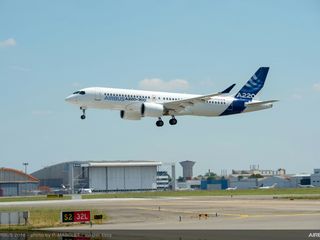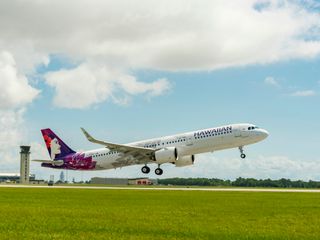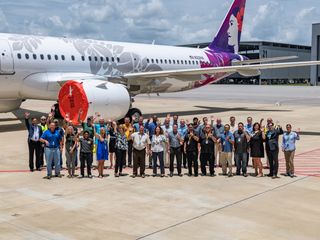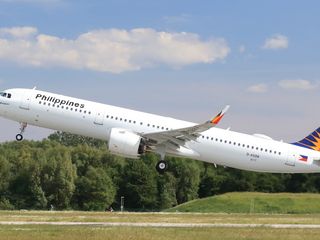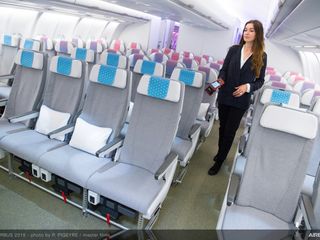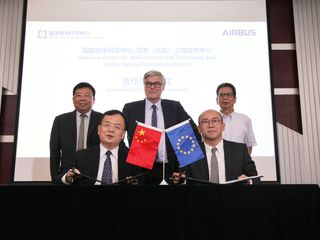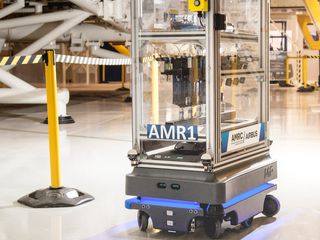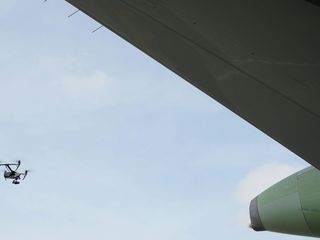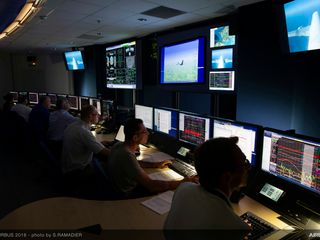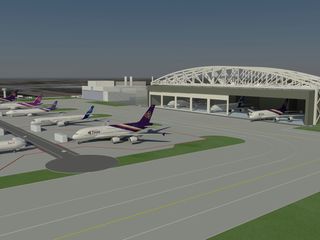Farnborough Airshow 2018 issue
Airbus introduces the A220-100 and A220-300 – Québec-born aircraft join the family
Airbus has revealed the A220 at a ceremony held at its Henri-Ziegler Delivery Centre, near Toulouse. Complementing the A320 Family, the A220-100 and larger A220-300 models cover the segment between 100-150 seats and offer a comfortable five-abreast cabin. The type serves a worldwide aviation market for smaller single-aisle jetliners estimated at around 7,000 such aircraft over the next 20 years. Going forward, Airbus will manufacture, market and support A220 aircraft under the recently finalised agreement with Bombardier and Canadian investors.
Airbus A220 successfully completes long term durability test campaign
The Full Scale Durability and Damage Tolerance (DADT) testing of the Airbus A220 has been recently completed. Underway since August 2014, the tests took place at IABG’s dedicated test facility in Dresden, during which the airframe metallic structure was subjected to 180,000 total flight cycles followed by residual strength testing. The campaign demonstrated compliance with the applicable TCCA, FAA and EASA regulations. It also validated primary structure durability, inspection techniques and intervals, typical repair procedures and damage tolerance – and consequently supported publication of the in-service repair manual. The ‘lessons learnt’ from the exercise permitted the implementation of structural optimisation into production very early into the programme.
100 A320 Family aircraft to demonstrate new FANS-C navigation capability for Airbus-led SESAR project
An Airbus-led project to demonstrate the sharing of an aircraft's predicted trajectory data with air traffic control will begin its operational phase involving revenue flights later this year. Around 100 in-service A320 Family aircraft will be progressively equipped with the new Airbus “FANS-C” avionics product by the end of 2019. FANS-C combines new datalink and telecommunications capabilities which allow for the transmission of the complete predicted four-dimensional aircraft trajectory (3D + time). The project, called “DIGITS”, stands for “Demonstration of air traffic management Improvements Generated by Initial Trajectory Sharing” and is part of the Single European Sky ATM Research (SESAR) initiative. With the cooperation of seven European airlines (Air France, British Airways, easyJet, Iberia, Novair, Thomas Cook and Wizz Air), the large-scale demonstration will last more than a year and collect data from over 20,000 flights. The overall goal is to optimise the aircraft's trajectory and make traffic flows more fluid. Airbus is targeting FANS-C certification later this year.
Airbus' Mobile FAL delivers its 1st A321neo aircraft
Hawaiian Airlines has recently taken delivery of its first US-produced A321neo. The aircraft, powered by Pratt & Whitney PW1000G turbofans, will be used by the airline to grow its Western-US network and provide greater access to its entire island chain. Hawaiian currently offers daily non-stop A321neo flights from Portland and Long Beach to Honolulu. The carrier will open additional A321neo routes between the US West-Coast and the Hawaiian Islands as it introduces a total of 18 aircraft through 2020.
Philippine Airlines’ A321neo starts long range route with business class
Philippine Airlines' (PAL’s) first new Airbus A321neo recently made its inaugural flight to Brisbane, Australia. This marks the start of PAL’s A321neo operations. The 168-seater aircraft, featuring 12 full-flat seats in business and 156 seats on economy, has IFE screens on all seats, free wi-fi connectivity. By 2019 the airline will have taken delivery of six new A321neos; the first two aircraft arrived in May and June 2018 respectively. The Brisbane-Manila route becomes the longest commercial route served by any Airbus A321neo aircraft.
CAAC approves A320 & A330 Competency-based training Type Rating
The Civil Aviation Administration of China (CAAC) has approved the new Airbus Flight Training A320 & A330 Type Rating programmes, for which the first Chinese trainees will start in August. Already approved by the European authority, EASA, this revised programme prioritises pilot competence acquisition. The main features of the new programme include: the development and assessment of fundamental pilot competencies through competency-based teaching, grading & assessment; the reinforcement of basic flying skills through new training modules; shifting the focus from outcome of events towards understanding the underlying behaviours required for successful execution and the earlier introduction of manual handling in the Full-Flight Simulator. The new A320 and A330 Type Rating and intermediate training modules incorporate the latest manufacturer modifications and meet the mandatory requirements for Upset Prevention & Recovery Training (UPRT) and Performance-Based Navigation (PBN) training. This approval results from the collaboration between ATC Beijing, Airbus Central Flight Training Organisation and the CAAC.
Airbus Interiors Services allies with Fujitsu on RFID and IoT services
Airbus Interiors Services (AIS) has formed a strategic alliance with Fujitsu to offer a portfolio of new, co-created solutions which accelerate and improve inspection routines, scheduled maintenance and other daily operational tasks. The partnership combines Airbus’ experience with introducing flyable RFID*, and with Fujitsu’s expertise in Information and IoT* technology. The first such service to be rolled-out is the Smart Emergency Equipment Manager (S-EEM) – a solution for rapid digital inspection of the cabin emergency equipment which simplifies the process of checking the serviceability, security and presence by location of each item of safety equipment in the aircraft. Rather than the current practice of having to visually check all items followed by paper and administrative work, an airline mechanics using S-EEM simply need to walk through the aircraft with an RFID handheld reader. The device immediately confirms that each piece is present, serviceable and secure while flagging any missing, expired or nearly expired items, reducing the time required for this crucial check from hours to minutes per aircraft. Going forward, the collaboration between AIS and Fujitsu will extend to further categories of components and equipment such as Repairables and Rotables.
*IoT = Internet of Things; RFID = Radio Frequency IDentification
Airbus extends technology research with Chinese partners
Airbus Beijing Engineering Centre (ABEC), a joint venture between Airbus and China Aviation Industry Corporation (AVIC), has opened a new nanocomposite materials lab jointly with National Centre for Nanoscience and Technology of China. The two parties also signed a cooperation agreement on engineering polymer nanocomposites for aeronautic applications. Both sides will undertake R&T activities on electrically conductive, self-healing and toughening nanocomposites. The aim is to explore the application of state-of-art nanocomposite technologies for aerospace. The research will be jointly conducted by ABEC engineers and a group of leading Chinese academies and universities, including NCNST, Tsinghua University, Sun Yat-Sen University, HK University of Science and Technology and Hong Kong Polytechnic University.
Airbus enhances its pilot training capacity in China
HUA-OU Aviation Training Centre, a joint venture between Airbus and China Aviation Supplies Holding Company (CAS), has received a new A320 full-flight simulator. With this new simulator located on the Airbus Beijing Campus, the training centre will hold three A320 full-flight simulators, one A330/A340 simulator and one H225 helicopter simulator. This simulator can support the A320neo, and is ready for the new UPRT (Upset Recovery Training) which is mandated by the CAAC. Since inception, over 38,000 aviation professionals from more than 50 airlines worldwide have been trained there.
Airbus BizLab inaugurates Spanish campus in Madrid…
Airbus has expanded its global network of BizLab campuses by opening a fourth site in Madrid (Spain) after Toulouse (France), Hamburg (Germany) and Bangalore (India). This milestone is part of a broader Airbus strategy to establish an international community of aerospace business accelerators. The new Madrid campus encompasses all Airbus businesses (Defence and Space, Airbus Helicopters, and Commercial Aircraft) and represents a strategic bridge between Europe and Latin America.
… and launches next season’s call for projects
Airbus BizLab recently launched its new call for projects worldwide. Pre-selected projects will be invited to a two-day final selection workshop with Airbus experts and top management in the four campuses from the end of August 2018. The selected submissions will kick-off the Airbus BizLab’s fourth Season in October 2018. Since the Airbus Bizlab launch, more than 1,000 start-ups have been in contact with BizLab; 50 Start-ups have been accelerated across the three sites as well as 40 internal projects. To date, 20 million euros have been raised by start-ups accelerated at the BizLab.
BizLab receives 214 applicants in Russia & Eastern Europe via “GenerationS” programme
Airbus Russia and BizLab, in collaboration with the Russian government-supported “GenerationS” start-up accelerator, have launched a joint competition aimed at finding innovative ideas and products in the aerospace industry. Since the competition was announced earlier this year, 214 submissions have been received from 50 cities in Russia, Belarus, Ukraine, Germany, Czech Republic and Switzerland. The business-oriented projects were transferred to Airbus BizLab’s corporate accelerator where the successful submissions will subsequently be invited to participate in a six-month accelerator programme in Toulouse, leading to possible opportunities to further develop and apply the resulting solution(s) in other company domains.
Airbus’ Broughton factory trials a new Autonomous Mobile Robot
As a further example of Airbus’ innovation for manufacturing systems digitalisation, a six-month shop-floor trial is underway at Airbus’ wing factory in Broughton, UK, concerning an Autonomous Mobile Robot (AMR). Developed as part of a UK-government funded collaborative research project, this is a small computer-guided vehicle designed to handle and transport small aircraft components and assembly tools around the factory. The AMR features smart navigation technology allowing it to develop real-time awareness of its surroundings to operate autonomously and avoid obstacles in its way. The vehicle builds a real-time 3D picture of the surrounding environment through the use of laser scanners and a pair of cameras to detect low level and overhanging obstacles. It uses a complex set of algorithms to calculate and negotiate a safe route around pre-programmed positions. In the future, the capabilities of such vehicles will be developed further to allow automated handling of large components within the factory. In addition, the technology could eventually be rolled-out across other Airbus sites.
Drone inspection comes to A320 FAL in Mobile Alabama
Staff from Atlanta, Georgia-based Airbus Aerial – the cloud-based, aerial analytics unit within Airbus – recently travelled to the Airbus USA Final Assembly Line (FAL) in Mobile, Alabama to demonstrate the effectiveness of using drones to conduct airframe inspections. During the trial a drone was used to inspect the tail section of an A320 Family aircraft. The flight further validated the use of drones for inspecting newly-manufactured airframes before delivery.
Airbus’ Telemetry Centre in Toulouse receives major upgrade
Airbus’ Telemetry Centre in Toulouse, which monitors the behaviour of Airbus’ development aircraft in the air during their flight test campaigns, recently underwent a major refurbishment, with new video and sound systems facilitating its work and opening-up future opportunities. The work started last November, and by January its three main operations rooms had been upgraded. Now 98-inch monitors – the largest available – are installed to provide experts with much more detailed images and purer colours. While the centre currently manages flights of Airbus and ATR aircraft, it may in the future extend its services to other Airbus divisions and other aircraft manufacturers. The Toulouse centre is Airbus’ largest telemetry facility, with others located in Bremen, Filton and Hamburg. From its three operations rooms, the centre can monitor between four and six test flights a day, and up to three flights simultaneously anywhere in western or southern France.
Airbus and GMF AeroAsia renew maintenance training services contract
Paving the way for more Airbus-standard courses in South East Asia, Airbus and Indonesia’s GMF AeroAsia have renewed their Maintenance Training Services (MTS) agreement for another five years. Over the last five years, the partnership between Airbus and Garuda Indonesia’s maintenance, repair and overhaul (MRO) arm has resulted in the integration of GMF AeroAsia’s instructors into the Airbus’ global maintenance training organisation. GMF AeroAsia has also grown its in-house type-training capabilities for Airbus A320 and A330 aircraft maintenance and developed its ab-initio training capabilities. This has allowed it to successfully offer maintenance training courses for local and regional Airbus customers. The renewal will bring Airbus training standards closer to the European manufacturer’s customers in South-East Asia, and position GMF AeroAsia as a leading provider of maintenance training services in the region.
Airbus and THAI sign agreement for MRO joint venture
Airbus and Thai Airways International (THAI) have signed an agreement to establish a new joint venture maintenance and overhaul (MRO) facility at U-Tapao International Airport near Bangkok. The new MRO will offer heavy maintenance and line services for all widebody aircraft types. It will feature the latest digital technologies to analyse aircraft maintenance data, as well as advanced inspection techniques, including the use of drones to monitor aircraft airframes. The facility will also offer specialised repair shops, including for composite structures, as well as a maintenance training centre providing extensive courses for technical personnel from Thailand and overseas. The joint venture between Airbus and THAI will be located at U-Tapao International Airport, at the heart of Thailand’s Eastern Economic Corridor.
Your media contacts
Contact us
Martin Fendt
Trade & Technical Press Specialist - Airbus Commercial Aircraft

